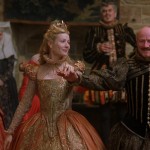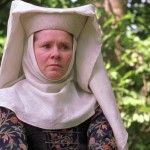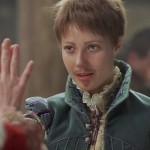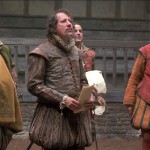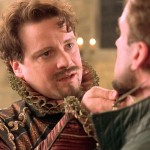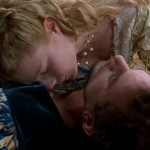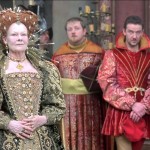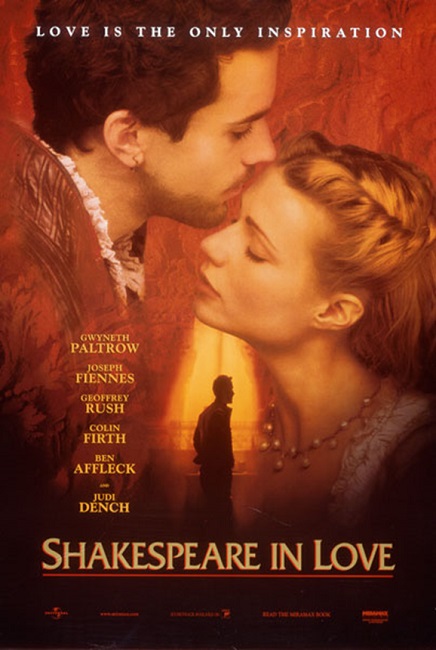
Shakespeare In Love – 1998
I love this movie. I have seen it many times before, but it never fails to catch my heart. It is a romance done right. Normally I’m not a huge fan of romances, but that is because they are usually painfully predictable or simply dull and lifeless. This movie gets it right without being sappy or dim-witted. It is based on one of Shakespeare’s most famous plays, Romeo and Juliet, but it does so in a most clever way. And it is interesting to note that the writers unapologetically ignored many historical facts and wrote a work of fiction.
Joseph Fiennes, the brother of actor Ralph Fiennes, plays a very young William Shakespeare in 1593 London. He is having writer’s block when starting a comedy, Romeo and Ethel, the Pirate’s Daughter. His financer, owner of The Rose Theatre, Philip Henslow, played by Geoffrey Rush, is demanding the new play, which Shakespeare’s writer’s block will not even allow him to start. But actors are called for and auditions begin.
One of the actors who auditions is a young man named Thomas Kent. He is actually a woman disguised as a man because women were not allowed to act on the stage in those days. She is actually Lady Viola de Lesseps, played by Gwyneth Paltrow. She is a young lady who loves plays, the theatre, and poetry above all. She has loved Shakespeare from afar because of his poet’s soul. She recites some of his poetry at her audition and he is so impressed that he demands that she remove her hat and say who she is. Doing so would reveal her gender, so she runs. He follows her and discovers who she is. And their romance begins.
Paltrow was incredible in her part as the high-born Lady who is hopelessly in love with the low-born and penniless playwright. This is the first movie in which I remember seeing her and I was so taken with her poise and beauty on the big screen that it came as no surprise to me when she won the Academy Award for Best Actress. She really turned in a wonderful performance.
And the romance was so well handled, so well written. Marc Norman wrote the screenplay along with playwright Tom Stoppard. The rest of the plot follows the two lovers’ passionate relationship as Shakespeare is inspired to write his famous love story Romeo and Juliet. The play he writes reflects his own romance with Viola. It is so incredibly clever and surprisingly believable how the events in his life make their way into the play.
But this clever device was used again on a larger scale at the same time. Little references from many of Shakespeare’s plays kept popping up in the movie at various times and in very subtle ways. You would really have to be an astute student of all of Shakespeare’s plays to get them all. For example, at one point, Shakespeare says to Henslow, “Doubt thou the stars are fire / Doubt that the sun doth move.”: a line from Hamlet. Even the first time Fiennes is on the screen, we see him crumpling paper into balls and throwing them around his room. One lands near a skull, another reverence to Hamlet, while another lands near an open chest, referencing The Merchant of Venice.
Another example is the whole plot device of a woman dressing as a man which was also done in Shakespeare’s Twelfth Night. At one point, it is even shown that Shakespeare’s Two Gentlemen of Verona is being performed. And of course there is the concept of a “play within a play” as the actors, playing actors, act out Romeo and Juliet as it is being written. There are even lines that show up in the normal conversations between characters that are references to several of Shakespeare’s sonnets. Norman and Stoppard obviously know their Shakespeare. And all these little things show up in the film as if they are the things which inspire Shakespeare to use them in his own plays.
But just like that of Romeo and Juliet, the relationship between Shakespeare and Lady Viola is doomed. Lady Viola is given in marriage to Lord Wessex, an arrogant man with no money and the good name of a nobleman. He is excellently played by Colin Firth, whom we may remember from his rather unmemorable role in The English Patient. But here, he had a more significant part and showed his skill as an actor quite well.
Interesting note: This is the second film in which Colin Firth has had his love interest stolen by one of the Fiennes brothers, the first being The English Patient, the Best Picture winner of 1996.
And while we are on the subject of good actors in the film, I would be remiss if I did not mention Judi Dench as Queen Elizabeth I of England. Now, she was incredible. She was a real screen stealer. She drew my focus and commanded my attention. She was wonderful to watch. She was simply perfect for the part and believable in her portrayal. She was mesmerizing and she won the Academy Award for Best Supporting Actress for the role.
Interesting note. Dench won the Best Supporting Actress award, though she had only about 8 minutes of screen-time. This is the second shortest winner in the history of this category, the first being Beatrice Straight in 1976’s Network.
Other notable actors in the movie were Simon Callow as Edmund Tilney, the Master of Revels in the employ of the Queen, Imelda Staunton as Viola’s nurse, Tom Wilkinson as Hugh Fennyman, the money behind Shakespeare’s play, Mark Williams, playing a bit part in the play, though he is most famous in America as Arthur Weasley in the Harry Potter Franchise, and Rupert Everett as Christopher Marlow, another famous playwright, a contemporary of Shakespeare.
Interesting note: Imelda Staunton and her husband Jim Carter both get to play the same role in the film. They both play the Nurse – Staunton as Viola’s Nurse, and Carter (remember – all female roles had to be played by men in those days) as Juliet’s Nurse.
But there are two other actors who caught my attention who are not big names or anyone whom you might even recognize. Barnaby Kay and Gregor Truter both played actors in the production of Romeo and Juliet. Their names were never given in the course of the film, though they were in the credits as Nol and James Hemmings, respectively. I’m not sure what it was about the two actors that caught my attention, but they did, and there you have it.
The music for the film was written by Stephen Warbeck and was really something special. It was lush, gorgeous, romantic and uplifting, all at the same time. And there were odd times in the film, times in which you would not expect to hear underscoring, when the music would be continuing in the background, giving the plot the feeling of being intertwined with some ephemeral beauty. Music is generally used to enhance action when no dialogue is being spoken. But Shakespeare In Love used it behind some of the dialogue, which had the effect of giving extra weight to the words coming from the actors. True, that is done in movies often enough, but it was a little trick Director John Madden used to wonderful effect. Warbeck took home his own Oscar for his work.
Another aspect of the film that won an Academy Award was the costumes. They were incredible. Of course, the women’s clothing of that time in history, at least the high-born ladies, were exquisitely detailed and elaborate. Women’s dresses would have been custom-made as well as hand-made. Each garment would have been unique. I imagine that the clothing worn by Judi Dench would have been designed based on existing records or portraits, but the gowns worn by Paltrow would have allowed the costumer, Sandy Powell, a little more freedom. And she really knew her stuff. She did a fabulous job and Paltrow looked stunning. The fact that her hair and makeup were always flawless didn’t hurt either.
Yet another thing that was impressive about the movie was the language. One of the drawbacks of Shakespeare, in general, is that its language is often difficult to understand. I suspect that what you hear in a Shakespeare play is fairly indicative of the actual language of then late 1500s. But Norman and Stoppard wrote a script that gave the audience no trouble at all in understanding what was being said, and yet it all sounded perfectly believable as language from that era. There was just the right mixture of old English and modern English.
Shakespeare In Love also had the wonderful opportunity to stage an engaging production of Romeo and Juliet, or at least scenes from it. Several scenes from the play were actually used as part of the plot of the movie itself, such as the famous balcony scene. Shakespeare actually climbs up to Lady Viola’s balcony, just as Romeo does in the play. But the comedy of the movie then took over as it is the nurse that finds him when he reaches the top. She begins screaming and he falls to land in the bushes. He is then chased across the grounds and out of the front gate.
I think that it was in this “play within a movie” where the two previously mentioned actors, Kay and Truter really caught my attention. And the costumes for the Romeo and Juliet scenes were fantastic. The Montagues were all in shades of blue while the Capulets were all in shades of red, making it easy to tell the two opposing families apart.
Through a specific set of circumstances, Viola ends up going on-stage as Juliet while Shakespeare, himself, ends up playing Romeo. And what happens is magical. They know that at that point in the film, Viola has been married to Lord Wessex. They can never be together. Acting out their parts in the play was like the final stolen moment of their passionate love-affaire. Their on-stage kisses were true and real.
And the final scene of the play was so well directed. It was priceless. Romeo enters the tomb and finds Juliet. He drinks his poison and dies, and it is like Shakespeare is the one drinking his death instead of Romeo. There is a perfectly timed pause as the tearful audience weeps at his tragic fate. But then when Viola sits up, an audible gasp is heard. She sees her dead lover and with real emotion, kills herself with his dagger. By the time it is all over, both I and the fictional audience was awash with tears.
Because as we all know, the play must end. And when it does, we must return to reality. In the context of the film, the reality is that Viola is married and must leave for Virginia while Shakespeare must watch her depart, knowing that he will never see her again. I shed even move tears.
Again, Norman and Stoppard’s script really tied up their story with a heart-wrenching ending worthy of a Shakespeare play. It was marvelously done and a pleasure to watch, even though I can never get through it without winding up as a puddle of tears. The Academy loves dramas, and while there was a fair amount of comedy in this movie, the intensity of the romantic drama was undeniable. It is easy to see why they, like me, loved Shakespeare In Love.

